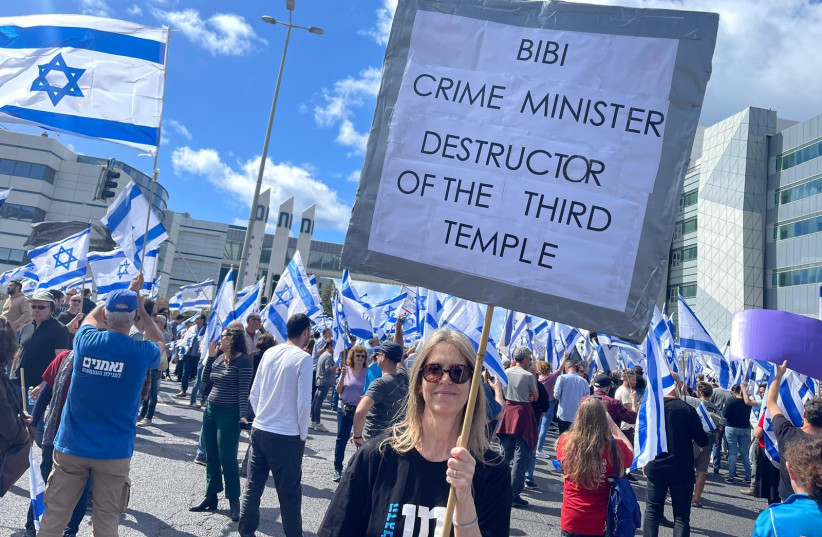The Israeli government’s decision to delay enacting badly-needed, reasonable, democratic judicial reforms brings to mind the famous adage, “justice delayed is justice denied.”
Delaying the judicial reform can enable the court to continue to ignore laws passed by Israel’s elected government; decide cases based on a judge’s subjective (left-wing) views of what’s reasonable; fail to require or examine evidence when acting as the High Court of Justice; decide cases where no party has standing; and perpetuate its extraordinary power by controlling sufficient seats on a judicial selection committee to enable the justices to select their own successors.
A delay can enable the unelected, self-appointed Israeli Supreme Court to maintain its tyrannical power over Israel’s democratically-elected branches of government. On March 19, during the height of the recent debate over judicial reform, the Supreme Court demonstrated its lawless, dictatorial control over the elected branches of government again by ruling that Israeli National Security Minister Itamar Ben-Gvir cannot issue direct or indirect operational orders to Israeli police forces.
How else can delaying judicial reform endanger Israel?
A delay can also enable the court to decide even more cases that violate Israel’s democratically-enacted laws; interfere with Israeli security, military actions and sovereignty; and jeopardize Israeli lives.
A delay will moreover reward the left-wing opposition, which lost the November 2022 election, for refusing offers to discuss compromise and instead endangering the country by violently clashing with police and blocking ports, the airport and roads, while Palestinian Arabs perpetuate multiple life-threatening terror attacks every day.

A delay will also encourage the Left to use these same dangerous mob tactics again and again to overturn election results. A delay will also reward the United States State Department for funding an organization (the so-called Movement for Quality Government or MQG) that organized the anti-government demonstrations. The delay can encourage even more illegal American and other foreign government interference in Israel’s internal affairs.
Delay also means that the Israeli government will be stuck with the absurd situation created by the Israeli Supreme Court in which the unelected attorney-general and legal advisers have dictatorial power over top elected Israeli officials. In normal democratic countries, the AG and his office work for elected officials. Absurdly, the Israeli AG banned Prime Minister Benjamin Netanyahu from speaking about judicial reform and from even engaging in compromise talks.
HEARTBREAKINGLY, A delay could cost more precious Israeli lives. We can never forget that the Supreme Court decision blocking the IDF from razing buildings used by terrorists to attack Israelis passing on the nearby road, despite the army’s plan to pay compensation to the absentee building owners, resulted in Arab terrorists using the buildings to slaughter a young pregnant mother, Tali Hatuel, driving along the road and her four young daughters, ages two to 11 years old.
A delay can also continue the Court’s penchant for interfering in other security measures that courts in other democratic countries do not involve themselves in, such as the Supreme Court’s interference with the route of Israel’s security barrier; methods of interrogating terrorists and demolitions of terrorists’ homes.
A delay could also give further aid and comfort to anti-Israel boycotters. A delay could let the Court again permit the entry into Israel of anti-Israel BDS activists in violation of Israel’s anti-boycott law, as the Court did in 2017 when it allowed the entry of the head of a chapter of a BDS organization, Students for Justice in Palestine (SJP). A delay could let the court again overturn the Israeli education minister’s decision to block a professor who supports BDS from receiving the Israel Prize, the state’s highest cultural honor.
A delay can continue to prevent Jewish owners from recovering their property, as for instance, occurred when the Israeli Supreme Court froze the lower courts’ eviction orders against illegal Arab squatters on Shimon Hatzadik properties owned by Jewish charities.
A delay can make it more difficult or impossible to free kidnapped Israelis. In the infamous 2000 John Does v. Minister of Defense case, the Israeli Supreme Court ordered the release of eight Hezbollah terrorists who needed to be held to negotiate a prisoner swap with Hezbollah, despite the fact that no law forbade the use of foreign terrorists this way.
The potential consequences of delaying judicial reform go on and on. Israel cannot afford to deny justice by delaying judicial reform.
The writer is the president of the Zionist Organization of America (ZOA).
